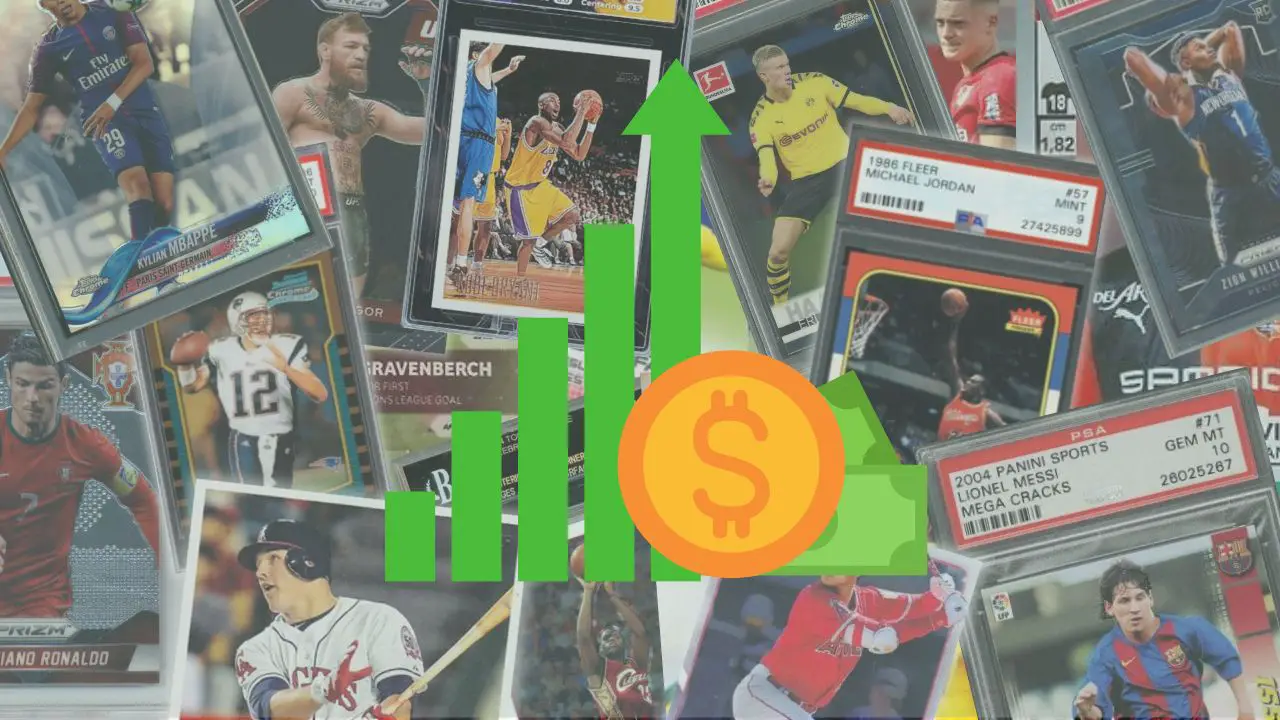
There are plenty of easy ways to find the value of sports cards these days; The internet has made it very easy to find out what a sports card is worth.
The quickest and easiest way to check the value of a card for free is by using eBay’s sold items filter, but in my opinion it’s better to use the Market Movers tool for tracking your cards’ values – I’ll cover all of that below.
Table of Contents
Quick Summary - Best Free Tools
Before I go into more detail, here’s a quick look at the best free tools to use to check the value of your sports cards:
1. Market Movers (Free Trial)
2. eBay Completed & Sold Items Filter
3. PSA Auction Prices
The Best Ways To Check The Value Of A Sports Card For Free
What’s the best way to find the value of trading cards? Well, previous sales data is the easiest way to get an indication of a card’s recent values, for free. A huge number of sports cards are sold via online auctions so the information can be found quite quickly.
My Top pick for tracking the value of sports cards is the Market Movers tool.
It’s also a tool that allows you to do so much more to manage your collection; I’ve used it for a while now, and it’s easier for tracking my collection than anything else I’ve tried.
While a full subscription for the tool isn’t free, you can get a free 2-week trial (using code: SCS20), which gives you time to check the values of cards in your current collection, or any you’re looking at buying.
The tool gives you access to data from numerous online auction sites that have sold sports cards, in one place.
You can search specific cards to see tables and graphs of all previous sale history, including the date they were sold.
Market Movers is not only good for checking the value of sports cards, it’s a good all-round collection management app; It just makes it easy to see the latest value of your complete collection, with historic and current data all in one place.
Here are some of the key features that I love using:
- Keep track of card values over time with tables and graphs for every card.
- Compare cards against each other – see how data (value and popularity etc) has changed over time between 2 or more cards at the same time.
- Track sales volumes of cards.
- Select all the cards in your personal collection and the tool will track them for you.
- See current profit and loss on cards you own based on real-time market data.
- Set price change alerts.
- Check graded card numbers.
- See the hottest and most popular cards right now.
- Check eBay deals for all sports cards.
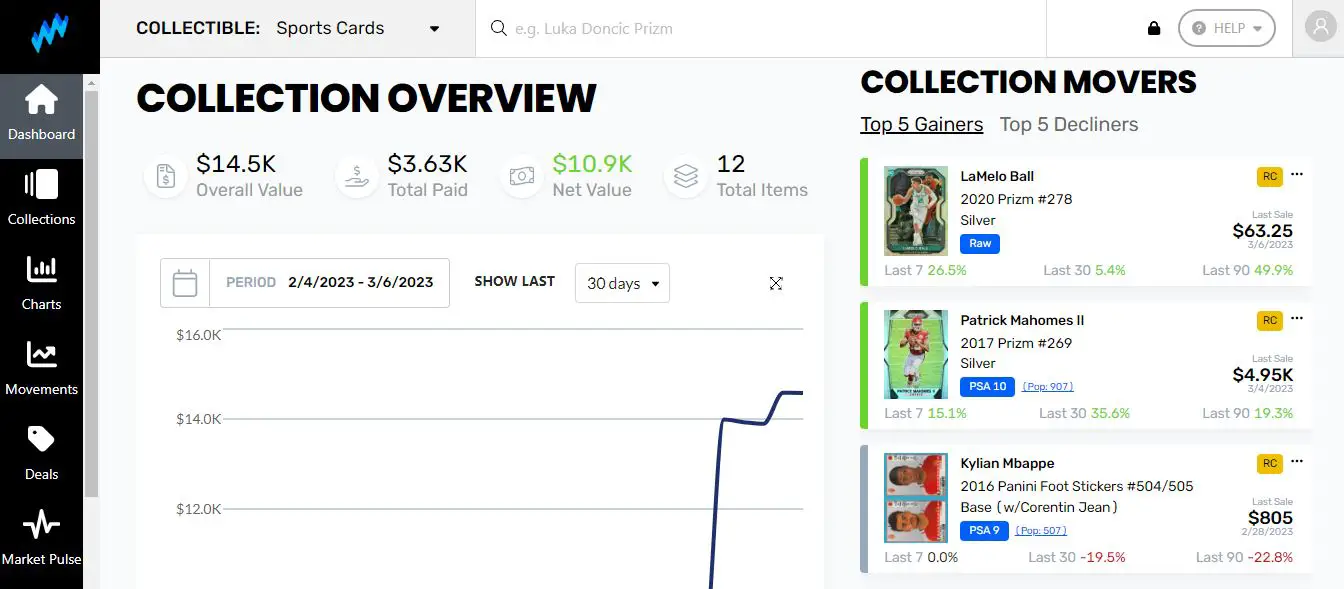
While a tool like Market Movers allows you to see data from online auction sites all in one place, you can also check some of them individually, on eBay.
Thousands of trading cards, both graded and raw, are sold daily on eBay, so there’s plenty of data to look at.
Looking at current live auctions of cards can be a way to see what other sellers value them at, however it’s important to remember that the price a card is listed for is often not what it’s going to be worth; Sellers naturally want to sell for as much as possible and will start the auction at an inflated price.
Luckily, eBay has a super useful feature which allows you to see what previous auctions finished at (and the date they finished).
Looking at items that actually sold is much better than looking at a live auction.
It’s the completed and sold items filter when you search for a card. When you make a search, there are filter options on the left-sided menu, you’ll just need to tick the ‘sold items box’.
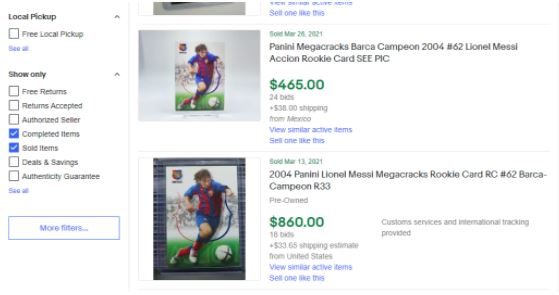
It’s best, if possible, to look at an auction which ended with bids, like the 2 in the example above, rather than the ‘buy it now’ option.
eBay won’t display a negotiated price if a counteroffer was made, it’ll just say ‘counteroffer accepted’, so it’s not possible to say exactly what the card was sold for.

Another great free tool you can use to check a trading card’s price for free is on the PSA website – The auction prices tool.
However, this only tracks cards that have been PSA graded.
It’s as simple as typing in the name of the player you’re looking for and searching. You’ll then see a full list of the different cards for that player, select the one you’re looking for and you’ll then see all the previous sales data for that specific card.
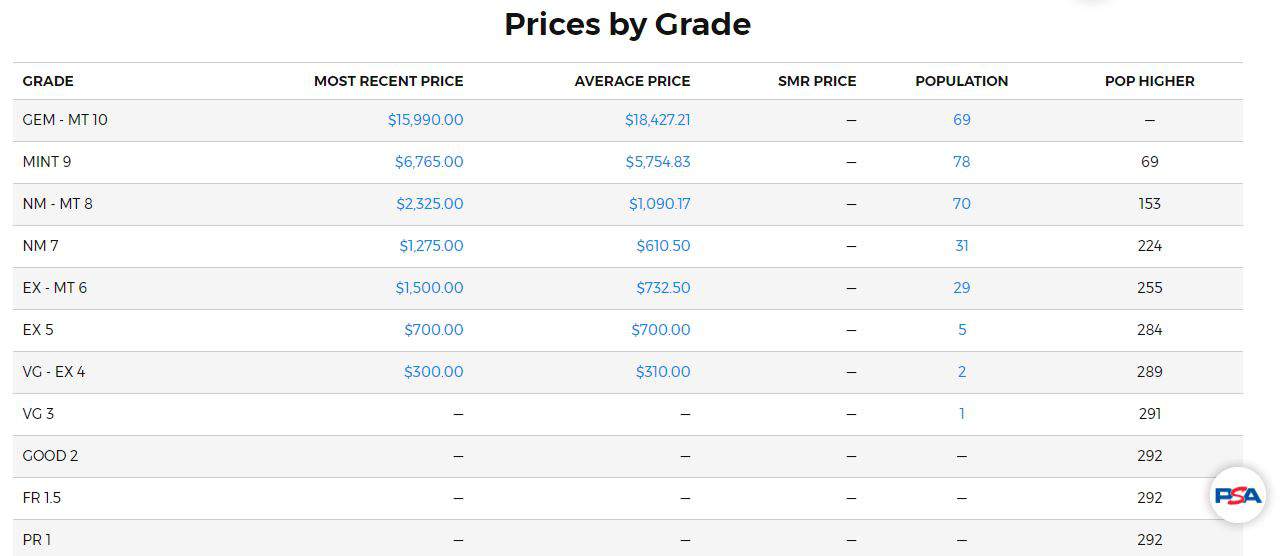
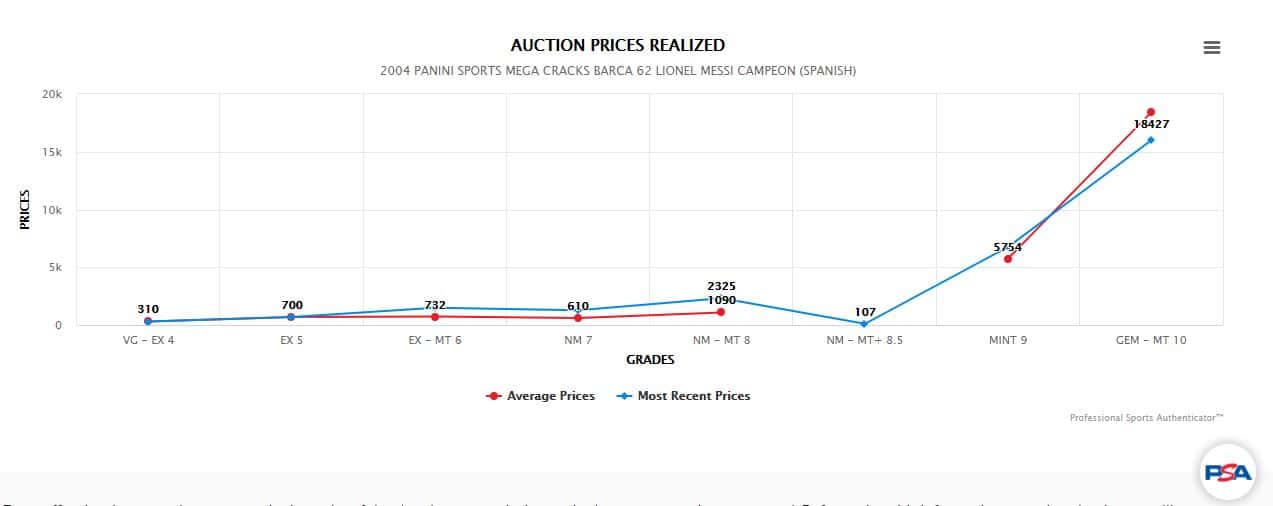
What If You Can’t Find Any Previous Auction Prices For A Sports Card?
There might be the occasional time that you can’t find a card’s value using previous sales data because they haven’t been sold on eBay or other online sites before.
This is where you need to use a number of different resources to make an educated estimate of the value.
Firstly, consider the factors that contribute to a card’s value, that I mentioned earlier.
You can also search for similar cards – for example if you can’t find a previous price for a card you have graded PSA 8, then have a look at the price of the same card graded a 7 and a 9 – that will at least give you a range.
Finally, you might not be an expert, but there’s likely someone who is; Try using online forums or discords to find someone who can give a better estimated value than you might be able to.
What Makes A Sports Card Valuable?
So, what actually makes a sports card valuable? There are multiple factors that contribute to a card’s value.
Firstly, it’s worth noting that the value of a card can often change, for many different reasons – It’s important to remember that when you’re looking for the value of cards that you own, especially when you’re using past sale data. It gives a good indication of recent history, but ultimately doesn’t guarantee an exact price on the secondary market.
– The first factor is the overall market. Sports cards are not an essential need – the price of the overall card market is dictated by the demand compared to the supply. Sports cards go through cycles, like any other market.
– Rarity is another factor that impacts a sports card’s price – I mentioned just now about price being dictated by demand compared to the supply, so naturally the rarer a card, the more value it will hold, particularly if it’s a card many collectors want. That’s due to the fact there’s just less of them around.
– The grade or condition of the card also plays a part in what determines its value – this one is sort of linked to rarity. Collectors favor cards that are in good condition, and particularly those that have been graded highly by the top grading services, like PSA or Beckett, for example.
Out of the total population or print run of a card, only a small percentage of those are going to be a gem mint PSA 10 – If you’re looking at cards from the 80s or 90s then this number becomes even smaller, in some cases non-existent.
– The last consideration is player popularity. Players having a great season and the hottest new rookies benefit from the hype surrounding them – more collectors are likely to want their cards, and that drives values up.
Legends of the sport will always have a higher demand as well. The position they play is something to also consider; The more exciting players are usually more popular (like quarterbacks in football, shooters in basketball or attackers in soccer for example), so their sports cards are more sought-after and valuable.
How To Identify A Sports Card?
Before you can check its value, you’ll need to identify exactly what sports cards you own.
If you don’t know what card you have (the set or the year that it’s from) then the fastest way to check is to Google the name on the card and any card/serial number displayed on it.
You can also search the manufacturer and year of release if it’s on the card itself.
Final Thoughts
Something to keep in mind is that just because a certain card sold at a price last time, that doesn’t mean it’s necessarily worth that right now. Especially with rare, high-ticket cards – there will be a lot less data on those and the chances are one hasn’t been available on the market for a while.
The timing of when you sell a sports card can have a huge impact on its value.
Also remember that sports card values are very fluid, and checking their value based on previous sales will only give you a rough estimate of their value.




